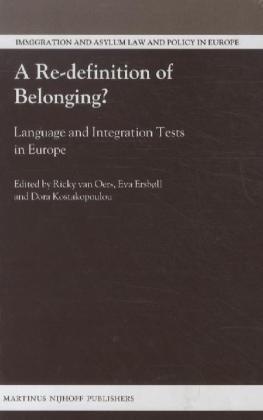Read more
Informationen zum Autor Ricky van Oers is a Ph.D. researcher at the Centre for Migration Law of the Radboud University Nijmegen. She has published on European trends in nationality laws (AUP, 2006) and the recent restrictive turn in Dutch citizenship policy. Eva Ersbøll is senior researcher at The Danish Institute for Human Rights. She has published extensively on nationality issues, including Acquisition and Loss of Nationality, vol. 1 and 2, (AUP, 2006). Dora Kostakopoulou is Jean Monnet Professor of European Law and European Integration at Manchester University. Klappentext As some Member States of the European Union lurch uncertainly towards nationalistic approaches to citizenship puzzling questions arise about the elements of that national identity. The search for legal mechanisms through which to describe national identity has increasingly focused on foreigners who apply to become citizens naturalisation. Devising for and applying state administrative tests to foreigners to determine whether they are sufficiently close to the national identity to merit citizenship reveals important cleavages in our understanding of the nature of identity and solidarity in the form of citizenship. This book provides a fascinating insight into the process of creating tests, applying them and the outcomes for individuals and societies. In the process it uncovers for us some very important assumptions about belonging in Europe in the 21st century. Elspeth Guild, Centre for European Policy Studies, Jean Monnet "ad personam" Professor of European Migration Law, partner London law firm Kingsley Napley, Visiting Professor at the London School of Economics In recent years several EU Member States have introduced new policies for the integration of immigrants from outside the EU. Some Member States introduced compulsory language and integration courses. Passing a formal citizenship or integration test has become a condition for family reunification, permanent residence or naturalisation in several European states. What image of citizenship is reflected in the content of those test? What are the effects of the new tests? Do the courses and tests enhance the integration of immigrants in society or do they function as a new instrument for selection and exclusion? This book provides essential and reliable information on new policies and legislation on integration of immigrants in Europe. Kees Groenendijk, Centre for Migration Law, Radboud University Nijmegen, Netherlands Inhaltsverzeichnis About the authors; Preface; Introduction Dora Kostakopoulou Chapter 1: All you need to know to become an Austrian; Naturalisation Policy and Citizenship Testing in Austria Bernard Perchinig! Austrian Academy of Sciences Chapter 2: Citizenship Tests in the Netherlands! Germany and the UK Ricky van Oers! Radboud University Nijmegen Chapter 3: On Trial in Denmark Eva Ersboll! Danish Institute for Human Rights Chapter 4: Integration measures in France: an evolving process between integration and migration issues Yves Pascouau! Universite Libre de Bruxelles and University of Pau and the Pays de l'Adour Chapter 5: Integration tests in Germany: a Communitarian Approach? Ines Michalowski! Social Science Research Centre Berlin Chapter 6: Ethnic citizenship - can it be obtained and tested? Judit Toth! University of Szeged Chapter 7: Latvian integration policy: lost in translation Kristine Kruma! Riga graduate school of law! LL.D.cand Lund Chapter 8: Language and integration requirements in Belgium: Discordances between the Flemish policy of 'inburgering' and the federal legislators' view(s) on integration of newcomers and migrants Marie-Claire Foblets and Zeynep Yanasmayan! Catholic University Leuven Chapter 9: Conclusions Ricky van Oers! Eva Ersboll! Dora Kostakopoulou Annex 1: Levels of language proficiency in the Council of Europe's Common European Framework of Reference. ...

